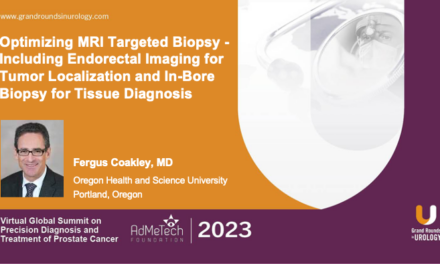Daniel P. Petrylak, MD, presented “The Role of Targeting DNA Repair Mutations in Advanced Prostate Cancer with PARP Inhibitors” during the 19th Annual Future Directions in Urology Symposium on August 11, 2018 in Colorado Springs, Colorado.
How to cite: Petrylak, Daniel P.. “The Role of Targeting DNA Repair Mutations in Advanced Prostate Cancer with PARP Inhibitors” August 11, 2018. Accessed [date today]. https://grandroundsinurology.com/controversies-in-renal-cell-carcinoma-adjuvant-tkis-and-clinical-trial-updates/
The Role of Targeting DNA Repair Mutations in Advanced Prostate Cancer with PARP Inhibitors – Summary:
Daniel P. Petrylak, MD, provides a brief update on clinical trials evaluating therapies that target DNA repair mutations in castration resistant prostate cancer (CRPC) patients, including poly (ADP-ribose) polymerase (PARP) inhibitors, agents that exploit hypoxia-inducing BRCAness, and next generation anti-androgens.
PARP Inhibitors for CRPC Patients with DNA Repair Mutations
A summary of studies from seven different institutions shows that DNA repair mutations express in about 12% of CRPC patients.
The TOPARP trial observed olaparib in CRPC patients with and without DNA repair mutations. Those patients with DNA repair mutations had a much higher response rate compared to those who did not. Furthermore, there are phase III trials currently evaluating PARP inhibitors, including olaparib, rucaparib, and veliparib.
Understanding drug responses in patients with DNA repair mutations is essential for therapeutic layering in prostate cancer.
Hypoxia-Induced BRCAness in Prostate Cancer
Because about 12% of CRPC patients have BRCA mutations, methods to use DNA repair mutations to cause cancer cell death are under evaluation. Dr. Petrylak’s junior attending physician, Joseph Kim, MD, is currently leading a randomized phase II trial comparing olaparib alone to an olaparib/cediranib combination to exploit hypoxia-inducing BRCAness. Patients in the olaparib alone arm who progress are eligible to receive cediranib. Hopefully, this combination therapy does induce BRCAness in these patients.
Next Generation Anti-androgens
Next generation anti-androgens can also benefit CRPC patients with DNA repair mutations. Preclinical data shows that abiraterone will increase or decrease DNA repair enzymes. A phase II study comparing veliparib with abiraterone to abiraterone alone show superior progression-free survival (PFS) with the combination. This study is expanding to a phase III trial in order to test the particular hypothesis. Additionally, there is a possibility that patients who do not have DNA repair mutations will respond to this combination. Appropriate patient selection is imperative when utilizing this combination, due to cardiovascular toxicity seen in this study. However, this is an exciting finding that needs further confirmation.
About Dr. Petrylak
Dr. Petrylak is the Professor of Urology and Medicine at the Smilow Cancer Hospital at Yale University. He has expertise in the research and development of new drugs and treatments, especially immunotherapies and checkpoint inhibitors, to fight prostate cancer.
About the Future Directions in Urology Symposium
The Future Directions in Urology Symposium (FDUS) is an annual collaborative meeting with a faculty consisting of the top researchers, physicians, and educators in the field of urology. During FDUS, experts provide updates on recent developments and debate innovative management approaches in genitourinary cancers and urologic conditions. Subsequently, the experts devise consensus statements in accordance with the discussions held in the meeting.
In this video, Dr. Petrylak discloses the thesis of the discussion he led during FDUS.
ABOUT THE AUTHOR
Daniel P. Petrylak, MD, is a Professor of Medicine, specializing in Medical Oncology and Urology, and Chief of Genitourinary Oncology at Yale University Cancer Center in New Haven, Connecticut. Dr. Petrylak is an internationally renowned medical oncologist and is considered a pioneer in the research and development of new drugs and treatments to fight cancers of the prostate, bladder, and kidney.





